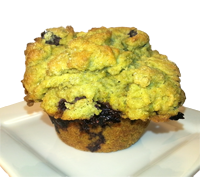Cooking with Tea: Blueberry Matcha Muffins
Over the last several years there have been numerous studies and articles on the many health benefits of tea--most of all green tea. We'll discuss those benefits at length in a future article but, in a nutshell, it has been shown that the catechin EGCG in green tea is effective in fighting cancer and heart disease. Studies have shown that in order to get the full benefit of EGCG one must drink 10 cups of green tea per day. That may sound like a lot to those of you who are not fond of green tea, but consider this: one cup of Matcha is equal to 10 cups of green tea!
Matcha is the powdered Japanese green tea that has been used for centuries in the Japanese tea ceremony. It is made using the finest shade grown tea, Gyokuro. Shading the leaves increases their chlorophyll content. After hand harvesting the leaves are briefly steamed to halt the enzyme activity and to trap nutrients in the leaf. It is then dried and lightly roasted to remove any trace of moisture. The final stage of production involves grinding on slow turning granite wheels to produce a fine powder which has much the same consistency as cornstarch. The careful processing of the leaves ensures that the nutrient content is as high as it can possibly be. Because Matcha drinkers consume the entire leaf—not just a simple infusion—they have the benefit of a higher concentration of antioxidants, vitamins, minerals and fibers than other teas—in fact 10 times more than any other green tea. There is no other fruit or vegetable in the world that provides more antioxidants than Matcha! According to the 2004 Journal of Agricultural Food Chemistry the top antioxidant superfoods (ORAC units per gram) are wolfberries with 303g; gojiberries with 253g; dark chocolate with 227g; pomegranate with 105g; acai berries with 60g; wheatgrass with 49g; and—get this!—Matcha with 1384g.
To capitalize on this people are finding many new and inventive ways to get their daily dose of Matcha: green tea ice cream; Matcha smoothies; Matcha lattes; Matcha frappes; Matcha cookies, Matcha cakes, etc. etc. There are Matcha recipes galore! Personally, I would rather drink it "straight-up," but for those of you who would rather not, here's one delicious way to enjoy your Matcha:

Blueberry Matcha Muffins (Makes 12)

8-ounces
Unsalted Butter, melted
4
Large Eggs
1-lb, 4-oz
Sour Cream
l-lb, 4.6-oz
Flour, all purpose
8.9-oz
sugar
4 1/2 tsp.
Baking powder
1 tsp.
salt
4 Tbl
Matcha
2-cups
Fresh Blueberries
1/4 cup
sugar
Preheat convection oven to 375 degrees (400 regular oven). Spray a 12-cup muffin tin with cooking spray.
Whisk together the melted butter and the eggs until well combined. Mix in the sour cream thoroughly and set the mixture aside.
Combine the dry ingredients (flour through Matcha) and whisk with a wire whisk until well combined, then sift to make sure the Matcha is evenly incorporated and is not lumpy. Make a well in the center and pour the wet ingredients into the center of the dry mixture. Fold the batter gently until about half-way mixed. Add the blueberries and continue folding until just combined. Do NOT over mix! (There should still be a bit of unincorporated flour. Not to worry. It will be absorbed during portioning. If there is any left over after everything has been portioned you can sprinkle it on top.) Divide the batter evenly between the muffin cups. The batter will be heaped high in the cups and it will look rather lumpy. Don't worry! It's supposed to look that way! Sprinkle the top of the muffins with sugar. Bake for 20-23 minutes, rotating half way through baking. A tester inserted into the center of the muffin should have moist crumbs sticking to it, but not wet batter.

0 comments